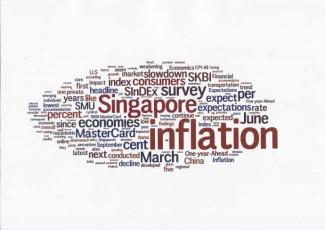
[Singapore, 19 January 2015 (Monday)] – The One-year-Ahead inflation expectations of Singapore households has dropped to 3.53%, according to the research findings of the latest quarterly survey for Singapore Index of Inflation Expectations (SInDEx) by Singapore Management University (SMU). Owing mainly to precipitous drop in global oil prices, and other signs of weakness in the nascent global recovery, coupled with an expectation of increase in benchmark interest rates, Singaporeans’ inflation expectations both in the medium-term (One-year-Ahead) and long-term (Five-year-Ahead) dropped in all categories.
Lower imported inflation, driven by oil prices near six-year low, seems to have substantive downward impact on reducing the perceptions of future inflation expectations. Despite the presence of significant domestic pass-through costs in a tight labour market and expected stimulus spending in the Eurozone and Japan, weakness in global demand seems to have brought both the overall inflation expectations and the Singapore core inflation expectations to their lowest levels since the SInDEx survey started in September 2011.
The SInDEx, which was originally developed by SMU’s Sim Kee Boon Institute for Financial Economics (SKBI) in collaboration with MasterCard International, is derived from an online survey of around 500 randomly selected individuals representing a cross section of Singapore households.
The online survey helps researchers understand the behaviour and sentiments of decision makers in Singapore households. This quarterly SInDEx survey has yielded two indices, SInDEx1 and SInDeX5. SMU Assistant Professor Aurobindo Ghosh and Professor Jun Yu are the co-developers of the SInDEx survey.
In the latest SInDEx survey conducted in December 2014, consumers shared their views on expectations of inflation-related variables over the medium term (One-year-Ahead) to long term (Five-year-Ahead).
The results of the December 2014 survey showed that compared to September 2014, the One-year-Ahead headline inflation (or CPI-All Item inflation) has moderated to 3.53% from 3.73% in September 2014, this is the lowest value of the headline inflation expectations since the survey’s inception in September 2011.
Compared to the historical headline inflation expectations average of 4.11% and the historical fourth quarter average of 4.08%, the current One-year-Ahead headline inflation expectations shows that Singapore households are cognisant of the global conditions and responding to price experiences and official communications and release of aggregated data from policymakers.
Following the overall headline inflation, the One-year-Ahead Singapore core inflation expectations (excluding accommodation and private transportation related costs) also dropped to 3.61% in December 2014 (from 3.95% in September 2014), representing the biggest drop since the survey’s inception in 2011. For a subgroup of the population who own their accommodation and use public transport, the One-year-Ahead Singapore core inflation rate was 3.63% in the December 2014 survey compared to 3.83% in September 2014. These respondents are possibly more informed about the Singapore core inflation rate as they do not have to face changes on accommodation or private transportation costs directly.
One-year-Ahead Singapore Index of Inflation Expectations (SInDEx1), a composite weighted index of One-year-Ahead inflation expectations, maintained an overall downward trend to 3.57%, its lowest level since the survey’s inception in 2011, and much lower than its historical average of 4.15%. SInDEx1 puts lower weightage on more volatile components like accommodation, private transportation, food and energy expenses, hence it is expected to be more stable than the all-inclusive headline inflation expectations.
Assistant Professor of Finance Aurobindo Ghosh, the Principal Investigator of the SInDEx Project at SKBI said, “For survey based instruments that are used for measuring inflation expectations, like SInDEx, there is less impact of base effects, unlike activity based measures like CPI-All Item inflation. Therefore, even though there is a significant drop in expectations of inflation among Singapore households, those expectations are still higher than the actual numbers that are observed based on economic data. Furthermore, in my opinion, the change of direction such as a drop in expectations of inflation is more informative than the actual level.”
“There is always an interplay between experience from domestic price pressures, imported inflation dynamics, and communications from policymakers in the formation of medium term and long term inflation expectations for households. Recent moderation in accommodation prices and private car prices in Singapore, exacerbated by the slump in oil prices which dampened imported inflation, seem to have brought down the current inflation rates and their expectations to very low levels.”
For the longer horizon, the Five-year-Ahead overall (CPI-All Items) inflation expectations in the December 2014 survey dropped to 4.48% (from 4.72% in September 2014), its lowest recorded level since the survey’s inception in 2011. The Five-year-Ahead Singapore core inflation rate (excluding accommodation and private road transportation related costs) also moderated to 4.13% from 4.45% surveyed in September 2014.
The composite Five-year-Ahead Singapore Index of Inflation Expectations (SInDEx5) in December 2014 dropped to 4.27% from 4.57% in September 2014, still significantly lower than SInDEx5’s historical average of 4.84%. This overall 0.3% drop in long term inflation expectations is indeed good news for moderation and early signs of anchoring of inflation expectations in the long run.
For more information, please contact
Teo Chang Ching (Mr)
Assistant Director
Corporate Communications
DID: 6828 0451
Email: ccteo [at] smu.edu.sg